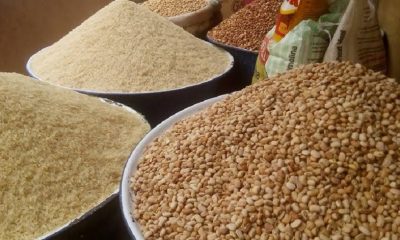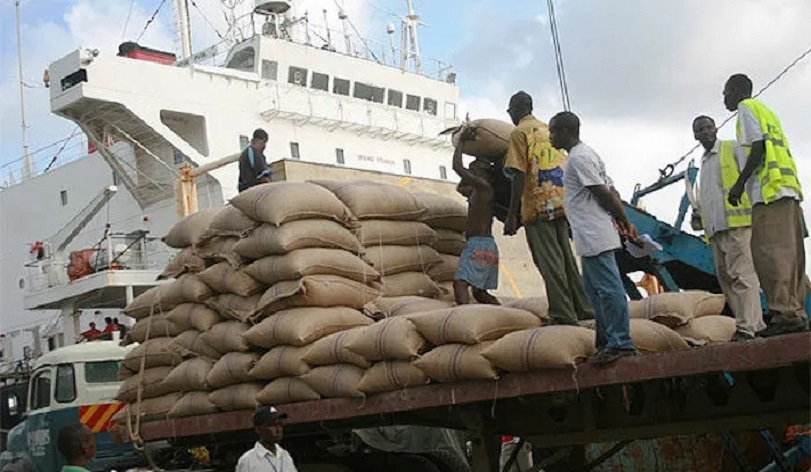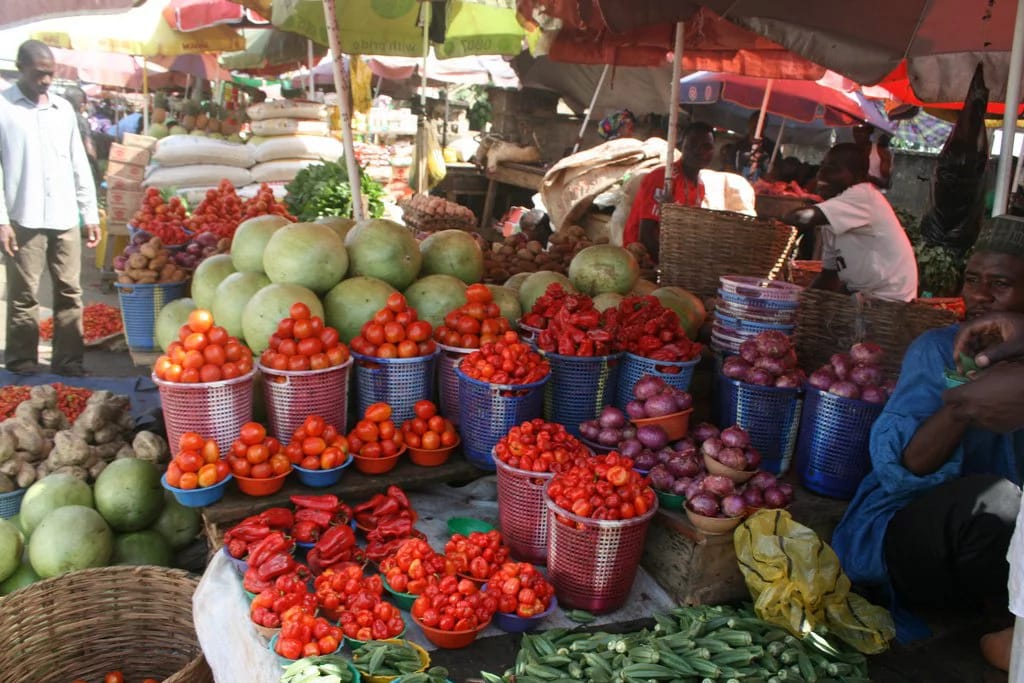Economy
Drought Pushing Food Prices up Sharply in East Africa
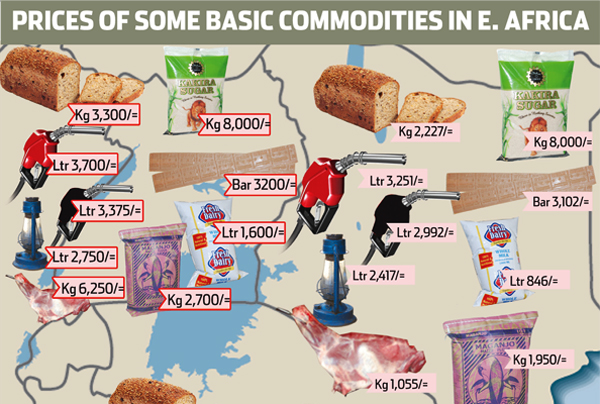
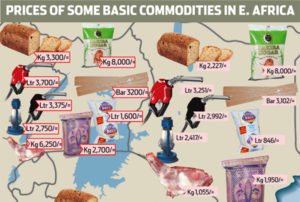
By Dipo Olowookere
Drought throughout East Africa has sharply curbed harvests and pushed the prices of cereals and other staple foods to unusually high levels, posing a heavy burden to households and special risks for pastoralists in the region.
Local prices of maize, sorghum and other cereals are near or at record levels in swathes of Ethiopia, Kenya, Somalia, South Sudan, Uganda and the United Republic of Tanzania, according to the latest Food Price Monitoring and Analysis Bulletin (FPMA).
Inadequate rainfall in most areas of the sub-region has put enormous strain on livestock and their keepers. Poor livestock body conditions due to pasture and water shortages and forcible culls mean animals command lower prices, leaving pastoralists with even less income to purchase basic foodstuffs.
“Sharply increasing prices are severely constraining food access for large numbers of households with alarming consequences in terms of food insecurity,” said Mario Zappacosta, FAO senior economist and coordinator of the Global Information and Early Warning System.
The trends in East Africa, where prices of staple cereals have doubled in some town markets, stand in marked contrast to the stable trend of FAO’s Food Price Index, which measures the monthly change in international prices of a basket of traded food commodities.
The difference is due to the drought that is hammering the sub-region, where food stocks were already depleted by the strong El Niño weather event that ended only last year. Poor and erratic rainfall in recent months, crucial for local growing seasons, are denting farm output.
Somalia’s maize and sorghum harvests are estimated to be 75 percent down from their usual level, and some 6.2 million people, more than half of the country’s total population, now face acute food insecurity, with the majority of those most affected living in rural areas.
Soaring prices
The FPMA Bulletin tracks food price trends on a granular level and in local terms, with an eye to flagging instances where the prices of essential food commodities increase sharply or are abnormally high.
In Mogadishu, prices of maize increased by 23 percent in January, and. the increase was even sharper in the main maize producing region of Lower Shabelle. Overall, in key market towns of central and southern Somalia, coarse grain prices in January have doubled from a year earlier.With an earlier than usual depletion of household stocks during the coming lean season and preliminary weather forecasts raising concerns for the performance of the next rainy season, prices are likely to further escalate in the coming months.
Maize prices in Arusha, United Republic of Tanzania, have almost doubled since early 2016, while they are 25 percent higher than 12 months earlier in the country’s largest city, Dar Es Salaam.
In South Sudan, food prices are now two to four times above their levels of a year earlier, exacerbated by ongoing insecurity and the significant depreciation of the local currency.
In Kenya, where eastern and coastal lowlands as well as some western areas of the Rift Valley all suffered below-average rainfall, maize prices are up by around 30 percent, with the increase somewhat contained somewhat thanks to sustained imports from Uganda.
Cereal prices aren’t the only ones rising. Beans now cost 40 percent more in Kenya than a year earlier, while in Uganda – where maize prices are now up to 75 percent higher than a year earlier – and increasing around the key border trading hub of Busia, the prices of beans and cassava flour are both about 25 percent higher than a year ago in the capital city, Kampala.
Double jeopardy for pastoralists
Drought-affected pastoral areas in the region face even harsher conditions.
In Somalia, goat prices are up to 60 percent lower than a year ago, while in pastoralist areas of Kenya the prices of goats declined by up to 30 percent over the last twelve months.
Shortages of pasture and water caused livestock deaths and reduced body mass, prompting herders to sell animals while they can, as is also occurring in drought-wracked southern Ethiopia. This also pushes up the prices of milk, which is, for instance, up 40 percent on the year in Somalia’s Gedo region.
Lower income from livestock collides with higher prices for cereals and other staple foods in a wrenching shock to terms of trade for pastoralist households. A medium-sized goat in Somalia’s Buale market was worth 114 kilograms of maize in January 2016, but at today’s prices can be traded for only 30 kilograms of the grain.
FAO uses its proprietary FPMA Tool, accessible to the public online, to monitor local markets and gather data for more than 1350 domestic price series in 91 countries around the globe in order to produce its Indicator of Food Price Anomalies.
Economy
Flour Mills Supports 2026 Paris International Agricultural Show

By Modupe Gbadeyanka
For the second time, Flour Mills of Nigeria Plc is sponsoring the Paris International Agricultural Show (PIAS) as part of its strategies to fortify its ties with France.
The 2026 PIAS kicked off on February 21 and will end on March 1, with about 607,503 visitors, nearly 4,000 animals, and over 1,000 exhibitors in attendance last year, and this year’s programme has already shown signs of being bigger and better.
The theme for this year’s event is Generations Solution. It is to foster knowledge transfer from younger generations and structure processes through which knowledge can be harnessed to drive technological advancement within the global agricultural sector.
In his address on the inaugural day of the Nigerian Pavilion on February 23, the Managing Director for FMN Agro and Director of Strategic Engagement/Stakeholder Relations, Mr Sadiq Usman, said, “At FMN, our mission is Feeding and Enriching Lives Every Day.
“This is a mandate we have fulfilled through decades of economic shifts, rooted in a culture of deep resilience and constant innovation. We support this pavilion because FMN recognises that the next frontier of global Agribusiness lies in high-level technical exchange.
“We thank the France-Nigeria Business Council (FNBC), the organisers of the PIAS, and our fellow members of the Nigerian Pavilion – Dangote, BUA, Zenith, Access, and our partners at Creativo El Matador and Soilless Farm Lab— we are exceedingly pleased to work to showcase the true face of Nigerian commerce.”
Speaking on the invaluable nature of the relationship between Nigeria and France, and the FMN’s commitment to process and product innovation, Mr John G. Coumantaros, stated, “The France – Nigeria relationship is a valuable partnership built on a shared value agenda that fosters remarkable Intercontinental trade growth.
“Also, as an organisation with over six decades of transformational footprint in Nigeria and progressively across the African Continent, FMN has been unwaveringly committed to product and process innovation.
“Therefore, our continuous partnership with France for the success of the Paris International Agricultural Show further buttresses the thriving relationship between both countries.”
PIAS is one of the most widely attended agricultural shows, with thousands of people from across the world in attendance.
Economy
NEITI Backs Tinubu’s Executive Order 9 on Oil Revenue Remittances

By Adedapo Adesanya
Despite reservations from some quarters, the Nigeria Extractive Industries Transparency Initiative (NEITI) has praised President Bola Tinubu’s Executive Order 9, which mandates direct remittances of all government revenues from tax oil, profit oil, profit gas, and royalty oil under Production Sharing Contracts, profit sharing, and risk service contracts straight to the Federation Account.
Issued on February 13, 2026, the order aims to safeguard oil and gas revenues, curb wasteful spending, and eliminate leakages by requiring operators to pay all entitlements directly into the federation account.
NEITI executive secretary, Musa Sarkin Adar, called it “a bold step in ongoing fiscal reforms to improve financial transparency, strengthen accountability, and mobilise resources for citizens’ development,” noting that the directive aligns with Section 162 of Nigeria’s Constitution.
He noted that for 20 years, NEITI has pushed for all government revenues to flow into the Federation Account transparently, calling the move a win.
For instance, in its 2017 report titled Unremitted Funds, Economic Recovery and Oil Sector Reform, NEITI revealed that over $20 billion in due remittances had not reached the government, fueling fiscal woes and prompting high-level reforms.
Mr Adar described the order as a key milestone in Nigeria’s EITI implementation and urged amendments to align it with these reforms.
He affirmed NEITI’s role in the Petroleum Industry Act (PIA) and pledged close collaboration with stakeholders, anti-corruption bodies, and partners to sustain transparent management of Nigeria’s mineral resources.
Meanwhile, others like the Petroleum and Natural Gas Senior Staff Association of Nigeria (PENGASSAN) have kicked against the order, saying it poses a serious threat to the stability of the oil and gas industry, calling it a “direct attack” on the PIA.
Speaking at the union’s National Executive Council (NEC) meeting in Abuja on Tuesday, PENGASSAN President, Mr Festus Osifo, said provisions of the order, particularly the directive to remit 30 per cent of profit oil from Production Sharing Contracts (PSCs) directly to the Federation Account, could destabilise operations at the Nigerian National Petroleum Company (NNPC) Limited.
Mr Osifo firmly dispelled rumours of imminent protests by the union, despite widespread claims that the controversial executive order threatens the livelihoods of 10,000 senior staff workers at NNPC.
He noted, however, that the union had begun engagements with government officials, including the Presidential Implementation Committee, and expressed optimism that common ground would be reached.
Mr Osifo, who also serves as President of the Trade Union Congress (TUC), expressed concerns that diverting the 30 per cent profit oil allocation to the Federation Account Allocation Committee (FAAC), without clearly defining how the statutory management fee would be refunded to NNPC, could affect the salaries of hundreds of PENGASSAN members.
Economy
Dangote Cement Deepens Dominance, Export Activities With $1bn Sinoma Deal

By Aduragbemi Omiyale
To strengthen its domestic market dominance, drive its export activities, optimise existing operational assets and enhance production efficiency and capacity expansion, Dangote Cement Plc has sealed $1 billion strategic agreements with Sinoma International Engineering for cement projects across Africa.
The president of Dangote Industries Limited, the parent firm of Dangote Cement, Mr Aliko Dangote, disclosed that the deal reinforces the company’s long-term growth strategy and aligns with the broader aspirations of the Dangote Group’s Vision 2030.
According to him, Sinoma will construct 12 new projects and expand others for the cement organisation across Africa, helping to achieve 80 million tonnes per annum (MTPA) production capacity by 2030, while supporting the group’s overarching target of generating $100 billion in revenue within the same period.
Under the Strategic Framework Agreement, Sinoma will collaborate with Dangote Cement on the delivery of new plants, brownfield expansions, and modernisation initiatives aimed at strengthening operational performance across key markets.
The new projects include a new integrated line in Northern Nigeria with a satellite grinding unit, a new line in Ethiopia and other projects in Zambia/Zimbabwe, Tanzania, Sierra Leone and Cameroon. In Nigeria, Sinoma will also handle different projects in Itori, Apapa, Lekki, Port Harcourt and Onne.
The projects signal Dangote Cement’s sustained commitment to consolidating its leadership position within the African cement industry, while enhancing its competitiveness on the global stage.
Chairman of the Dangote Cement board, Mr Emmanuel Ikazoboh, during the agreement signing event in Lagos, explained that the new projects would enable the company to play a critical role in actualising Dangote Group’s Vision 2030.
The new projects, when completed, will increase Dangote Cement’s capacity and dominant position in Africa’s cement industry.
On his part, the Managing Director of Dangote Cement, Mr Arvind Pathak, said the agreement reflects the company’s determination to grow its investments across African markets to close supply gaps and support the continent’s infrastructural ambitions.
According to him, Dangote Cement is committed to making Africa fully self‑sufficient in cement production, creating more value and linkages, leading to increased economic activities and a reduction in unemployment.
-

 Feature/OPED6 years ago
Feature/OPED6 years agoDavos was Different this year
-
Travel/Tourism10 years ago
Lagos Seals Western Lodge Hotel In Ikorodu
-

 Showbiz3 years ago
Showbiz3 years agoEstranged Lover Releases Videos of Empress Njamah Bathing
-

 Banking8 years ago
Banking8 years agoSort Codes of GTBank Branches in Nigeria
-

 Economy3 years ago
Economy3 years agoSubsidy Removal: CNG at N130 Per Litre Cheaper Than Petrol—IPMAN
-

 Banking3 years ago
Banking3 years agoSort Codes of UBA Branches in Nigeria
-

 Banking3 years ago
Banking3 years agoFirst Bank Announces Planned Downtime
-

 Sports3 years ago
Sports3 years agoHighest Paid Nigerian Footballer – How Much Do Nigerian Footballers Earn





